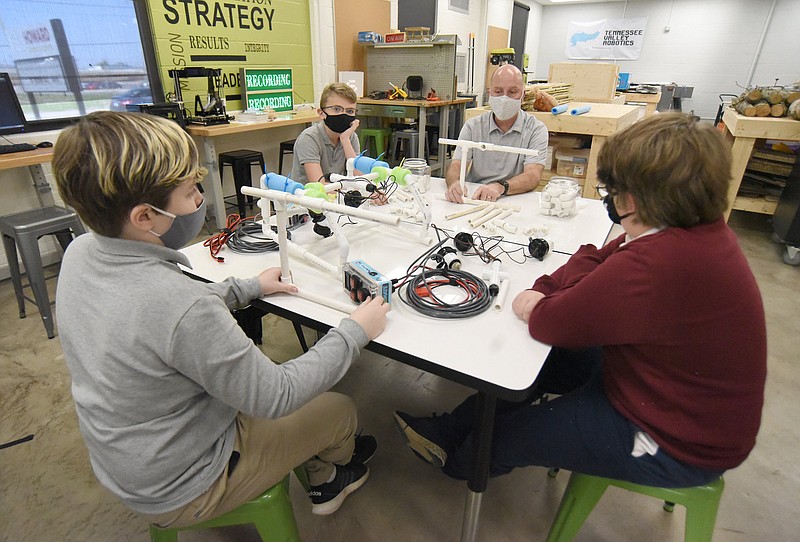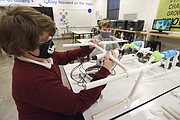School swimming pools are typically used for swimming and dive practice. At Howard Connect Academy, students use an indoor pool, located in its own classroom, to navigate their own underwater remotely operated vehicle.
The pool and access to other resources come from Tennessee Valley Robotics, a nonprofit organization working with Hamilton County Schools to bring robotics curriculum into every school through a $1 million effort over the next five years.
The nonprofit, founded five years ago, works as an intermediary between schools and organizations that supply equipment and curriculum. The funding will come from grants, internally raised funds and a Tennessee Valley Authority retiree organization.
"Where we are now is just at the tipping point where we want to do some pilot programs and evaluate what works and doesn't work and then proceed with different schools, different grade levels within schools so that eventually every grade level and every school will have access to this particular learning experience," said Charley Spencer, a founding partner of Tennessee Valley Robotics and a retired TVA employee.
The programs will be accessible to students with disabilities and English language learners, Spencer said, so that all students have an opportunity to engage with robotics curriculum.
Tennessee Valley Robotics also partners with a robotics organization called FIRST. Scott Rosenow, a founding member of Tennessee Valley Robotics and teacher at Howard Connect Academy, acts as a program delivery partner for FIRST to provide training to teachers entering the program and organize competitions in the region. He works with students after school using the VEX IQ program with a team of 16 students and MATE ROV underwater program with a team of three students.
"That's really our key goal - how can we spread the experiences robotics and other STEM programming can provide to as many students, not necessarily because we think they should be a part of a team, but because we really believe that the learning experience that can come from this is so interrelated to the curriculum content that they're learning throughout the school day," Rosenow said.
He said the experiences give the learning "kind of a sense of purpose that maybe otherwise [students] couldn't sense."
Howard Connect Academy opened in fall 2019, and the VEX IQ team consisted of four students in its first year. After the team qualified for and attended a state competition, more students saw the team's knowledge and success and the team grew to 16 students this year, Rosenow said.
He began working with three sixth graders using the MATE ROV program in the second half of the fall semester, even when two of the students were learning remotely. This is the first year students are working with the program, but Rosenow thinks a similar outcome will occur.
"I think that when the bigger student body sees these students navigating this ROV in the pool and completing a task where they pick things up and talking about what they've learned next year I'll have 20 people that want to be a part of the ROV team," he said.
Tennessee Valley Robotics piloted a robotics program in five Hamilton County middle schools last spring that was successful for some schools and not others because of COVID-19, but it has since expanded.
"We now have eight schools at the middle school level here in Hamilton County that have a curriculum-based robotics program using Vex IQ classroom robot kits and [that are] following a very flexible curriculum," Rosenow said. "They can pick and choose the challenges that they think are most connected to their students' ability level, and an introductory set of lessons that helped them to introduce that equipment and the process of robot design and programming to their students."
Spencer said the organization does not want to create new classes for robotics, but integrate them into curriculum depending on each school and its teachers. The curriculum won't be one-size-fits-all, he said, and teachers will get training and support.
Volkswagen Chattanooga is another company that sponsors Tennessee Valley Robotics and supports its efforts to expand robotics into schools.
"We've hosted the VEX IQ challenge in our conference center for a couple of years now, and we've seen firsthand the learning environment that is created," said Amanda Plecas, head of communications for Volkswagen Chattanooga Operations. "So, Tennessee Valley Robotics and Hamilton County Schools, they're providing a learning environment that helps to prepare students with important critical thinking skills, problem-solving skills that sets them up for success, no matter what career path they choose."
Rosenow said another pilot program for three elementary schools using LEGO Education products is set to begin this spring.
Contact Anika Chaturvedi at achaturvedi@timesfreepress.com or 423-757-6592.

